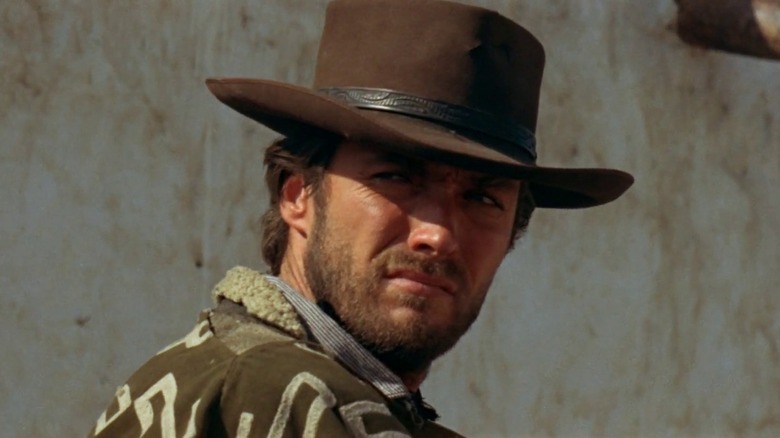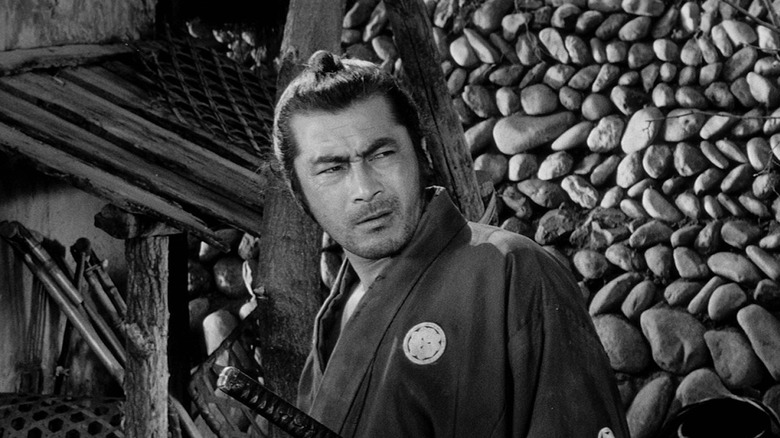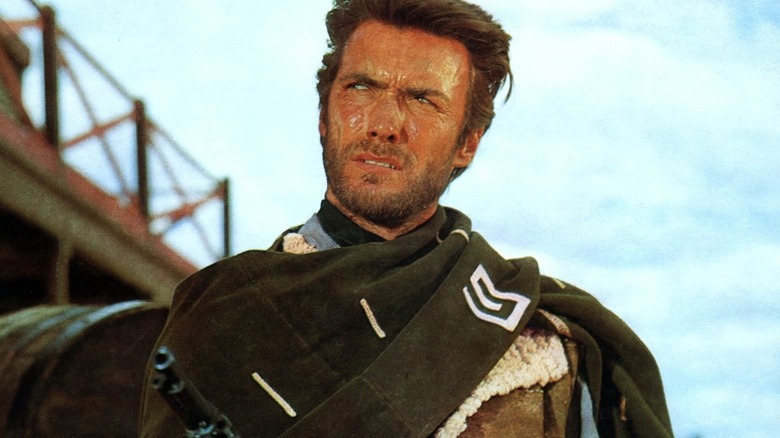One Production Mistake On A Fistful Of Dollars Cost Millions
A lone stranger wanders through the countryside. He walks into a small town that, at first, looks deserted. When the stranger finally meets a few locals and begins talking to them, he finds that the entire town, though remote, is under the uneasy control of two warring criminal gangs. The stranger, identified as a dangerous handler of weapons, is enlisted by each side of the gang conflict to help eradicate the other. The stranger, cynical and perhaps a bit playful, manipulates both sides into killing each other. After a violent conflagration, the stranger wanders away from the town, happily leaving the madness behind.
This is the story of Akira Kurosawa's 1961 film "Yojimo," written by Kurosawa and Ryūzō Kikushima. "Yojimbo" is easily the most cynical film in Kurosawa's filmography, bitterly taking glee in the copious amount of stupidity-inspired death depicted. Kurosawa, with a scoff, might have been making a dismissive comment on the nature of violence-based action movies. It's telling that the lead character Sanjuro (Toshirô Mifune) manipulates a scene of gang warfare, and then takes to a tower to witness the mayhem he authored. In many ways, Sanjuro is a film director.
The above is also the story of Sergio Leone's 1964 film "A Fistful of Dollars," which wasn't just similar to "Yojimbo" — it was a beat-for-beat remake. Instead of 1860s Japan, "Fistful" is set at a similar time on the U.S./Mexico border. Instead of a rogue samurai, it's a rogue gunslinger, played by Clint Eastwood. "Fistful" even included a few shots from Kurosawa's film. The story plays out in pretty much identical fashion.
In watching the opening credits for "Fistful," however, one might note that neither Kurosawa, Kikushima, or Toho, the company that distributed "Yojimbo," were credited. That turned out to be an expensive "oops."
We made a mistake
Many years later, Leone would admit that he and his producer had made a terrible mistake in not crediting Kurosawa and Kikushima, and, perhaps worse, not paying Toho a single lira/yen for the rights to a remake. In a 1984 interview with American Film Magazine, Leone finally confessed to — or at least found who was to blame for — the oversight. In a roundabout way, he was reminded of Kurosawa in merely listing his name alphabetically alongside other renowned international filmmakers. This led to a very quick, almost off-the-cuff, explanation as to what went down. In Leone's own words:
"I come right after the letter L in the director's repertory, in fact a few entries before my friend Mario Monicelli and right after Alexander Korda, Stanley Kubrick, and Akira Kurosawa, who signed his name to the superb 'Yojimbo,' inspired by an American detective novel, while I was inspired by his film in the making of 'A Fistful of Dollars.' My producer wasn't all that bright. He forgot to pay Kurosawa for the rights."
The American detective novel Leone refers to is Dashiell Hammett's 1931 book "The Glass Key," which was adapted to film in 1942, and which Kurosawa once said served as an inspiration for "Yojimbo." The story of "Yojimbo" is, in actuality, closer to that of Hammett's '29 novel "Red Harvest," but never mind.
The producer in question could be either Arrigo "Harry" Colombo or Giorgio Papi, the two credited producers on "Fistful." He doesn't give the specific name. Whether or not Leone was fudging a story and passing the buck must remain a matter of speculation. In passing the buck, however, Leone admitted to losing millions of bucks.
That is my place in cinema history
Whether it was Leone himself or one of his producers, Toho ended up suing. In "The Emperor and the Wolf," Stuart Galbraith IV's invaluable 2001 tome on Kurosawa and his main man, Toshirô Mifune, Kurosawa was quoted as saying "'Fistful' was "a very fine movie, but it was my movie." Leone is reported to have completely ignored the lawsuit for a time, and the case never made it to court. Kurosawa liked "Fistful," and Leone had assumed that Kurosawa would have, but that didn't stop Leone from having to pay a huge fine. Leone said:
"Kurosawa would certainly have been satisfied with very little and so, afterwards, my producer had to make him rich, paying him millions in penalties. But that's how the world goes. At any rate, that is my place in cinema history."
Reportedly, the case settled out of court to the tune of 15% of the "Fistful" grosses, as well as an additional $100,000. Kurosawa and Kikushima still, to this day, are not credited as inspiring "Fistful."
Other "Yojimbo" remakes would follow "A Fistful of Dollars." The 1984 low-budget Argentine fantasy flick "The Warrior and the Sorceress" with David Carradine is a peplum rendition of the story, while Walter Hill's 1996 film "Last Man Standing" transposes the "Yojimbo" story to a prohibition-era mob town. Bruce Willis plays the Mifune character.
In Hill's version, Kurosawa and Kikushima are credited.


